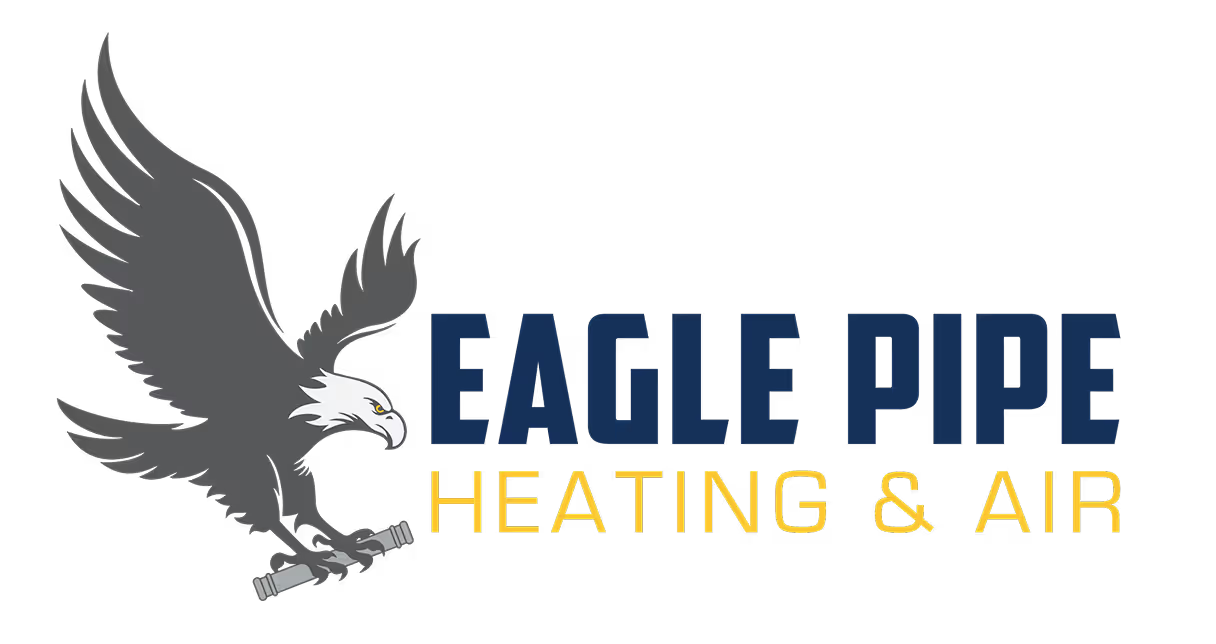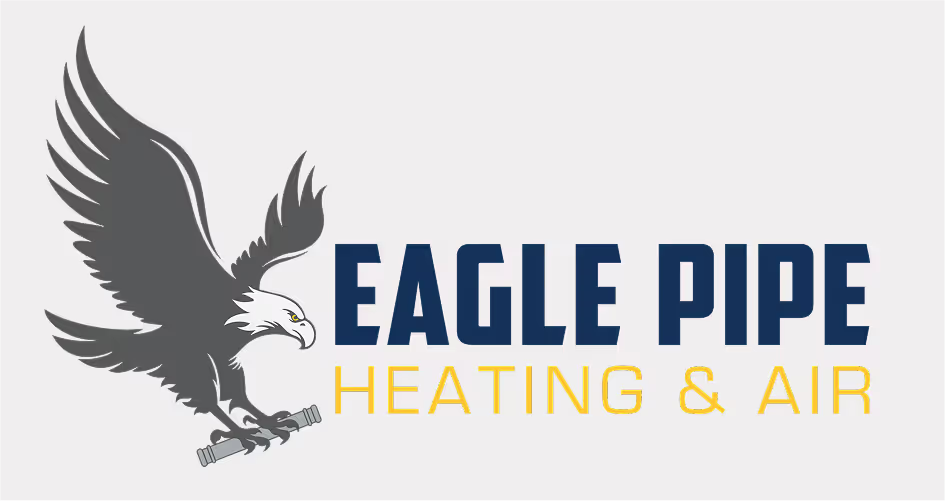What is an Energy Audit Service and Why Do You Need One?

Why Your Home Needs an Energy Audit Service
An energy audit service is a comprehensive assessment that identifies where your home wastes energy and money. Think of it as a health check-up for your house - it finds the problems you can't see and gives you a clear plan to fix them.
What you get from an energy audit service:
- Professional assessment using specialized tools like blower door tests and infrared cameras
- Detailed report showing exactly where you're losing energy and money
- Prioritized recommendations for improvements that deliver the best return on investment
- Potential savings of 10-20% on your monthly energy bills
Most homeowners are surprised to learn their biggest energy problems aren't what they expected. That teddy bear stuffed in a vent might be a symptom, but the real issue could be leaky ducts losing 30% of your heated or cooled air into crawl spaces.
The process is straightforward: a certified energy auditor visits your home, performs scientific tests, and creates a roadmap for making your home more comfortable while cutting your utility bills. As one energy expert puts it, "A professional energy assessment can provide an expertly designed roadmap to saving money and improving the comfort of your home."
Whether you're dealing with drafty rooms, sky-high energy bills, or just want to improve your home's efficiency, an energy audit service gives you the facts you need before spending money on improvements.
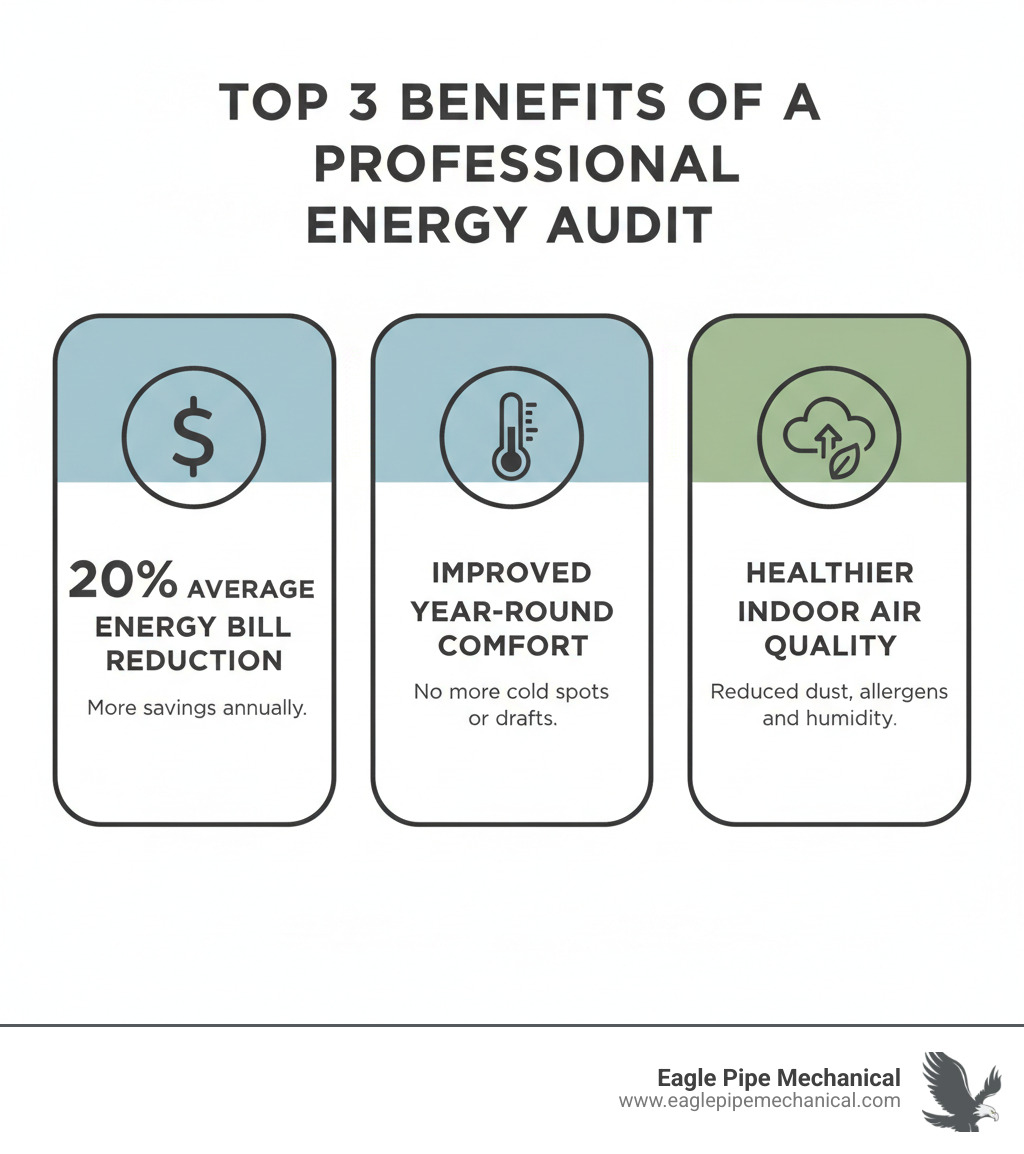
What is a Home Energy Audit? The Whole-Home Check-Up
Think of an energy audit service as a complete physical exam for your house. Just like you wouldn't want a doctor to diagnose you based on just checking your pulse, a proper home assessment looks at every system in your home to understand the full picture.
A home energy audit is a scientific evaluation that goes way beyond walking around with a clipboard. It's a comprehensive building science approach that examines how your home uses energy, where it wastes energy, and why certain rooms feel uncomfortable while your bills keep climbing.
Here's what makes it different from just guessing at problems: root cause analysis. Instead of assuming your drafty living room means you need new windows, an energy auditor uses specialized tools and testing to find the real culprits. Maybe it's actually leaky ducts losing heated air, or gaps in your attic insulation, or even HVAC high energy consumption issues you never knew existed.
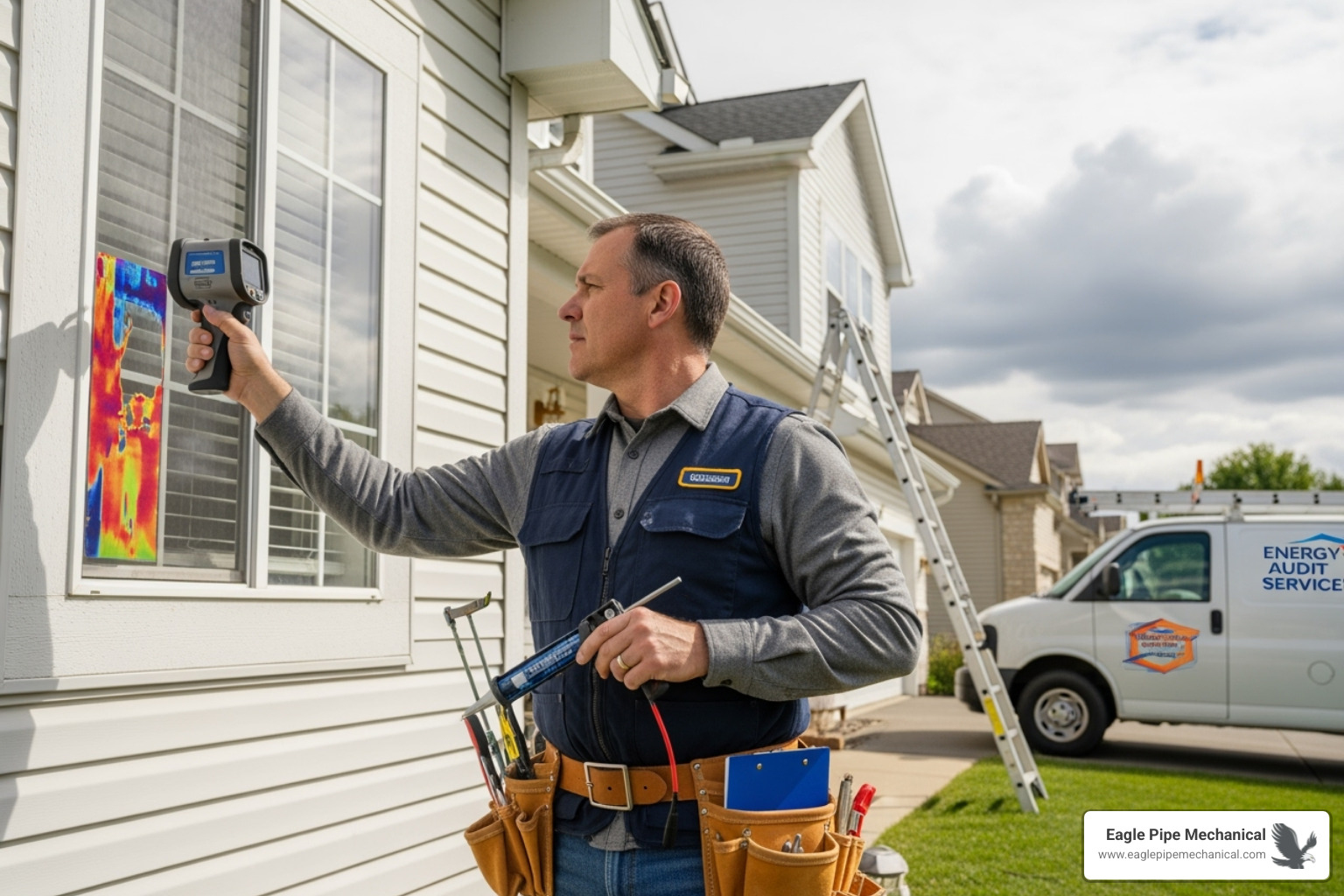
You might hear the terms "energy assessment" and "energy audit" used interchangeably - and that's perfectly fine. They both describe the same thorough process of identifying energy waste through careful data collection and testing.
The whole-home approach is what makes this so effective. Your house is a system where everything connects. The way air moves through your home, how your heating and cooling systems work, and even your family's daily habits all play a role in energy usage evaluation.
But here's something many people don't realize: a proper energy audit service also includes a health and safety inspection. We're not just looking at your energy bills - we're making sure any improvements won't create problems like poor air quality or carbon monoxide issues. After all, what good is saving money if your family isn't safe and comfortable?
By the end of this whole-home check-up, you'll finally understand why that one bedroom is always too hot, where your energy dollars are really going, and which improvements will give you the biggest bang for your buck.
The Key Benefits: Saving Money, Boosting Comfort, and More
When you invest in an energy audit service, you're not just buying a report - you're open uping a whole suite of benefits that will make your home more comfortable, your bills smaller, and your family healthier.
Let's start with everyone's favorite topic: cost savings. Most homeowners see their energy bills drop by 10-20% after following their audit recommendations. That might not sound earth-shattering, but think about it this way - if your monthly energy bill is $200, you could save $40 every single month. That's nearly $500 per year, year after year. These aren't just temporary savings either; they keep adding up for as long as you live in your home.
But here's where things get really interesting. The improved home comfort might actually matter more than the money you save. You know those rooms that are always too hot in summer and freezing in winter? An energy audit service helps eliminate those frustrating temperature swings by identifying where your conditioned air is escaping.
Eliminating drafts is one of the most noticeable improvements homeowners experience. No more mysterious cold spots or rooms that never seem to reach the right temperature. When your home is properly sealed, your heating and cooling systems don't have to work overtime, and you get consistent temperatures throughout the house.
There's another benefit many people don't expect: healthier indoor air quality. Those same air leaks that waste energy also let in dust, pollen, and moisture. When you seal up these problem areas, you're not just keeping conditioned air in - you're keeping contaminants out. This is especially important if anyone in your family deals with high indoor humidity problems or allergies.
Beyond your immediate comfort, an energy-efficient home often has increased property value. Today's buyers are increasingly interested in homes with lower operating costs and better comfort. Plus, you're doing your part for the environment by reducing your carbon footprint - it's nice when doing the right thing also saves you money.
Perhaps most importantly, an energy audit service helps you prioritize home improvements intelligently. Instead of guessing which upgrades will give you the biggest bang for your buck, you'll have a clear roadmap showing exactly where to focus your time and money first.
The Professional Energy Audit Service Process: What to Expect
When you schedule a professional energy audit service, you're starting a journey to truly understand how your home uses energy. The process is thorough and systematic, designed to uncover the hidden reasons behind your high energy bills and uncomfortable rooms.
Your audit begins with a detailed homeowner interview. Which rooms feel stuffy in summer or drafty in winter? Have you noticed any unusual odors or moisture problems? Your lived experience provides crucial clues that no instrument can detect. Several months of your utility bills will be reviewed to understand your energy consumption patterns and spot any unusual spikes.
The heart of the process is the comprehensive on-site assessment. This is where certified auditors roll up their sleeves and get to work with specialized diagnostic tools - using advanced technology to measure exactly how your home performs. The data collection phase involves testing everything from air leakage to combustion safety.
To see exactly what happens during this process, you can watch what happens during a home Energy Audit. It's fascinating to see how much detective work goes into understanding your home's energy personality.
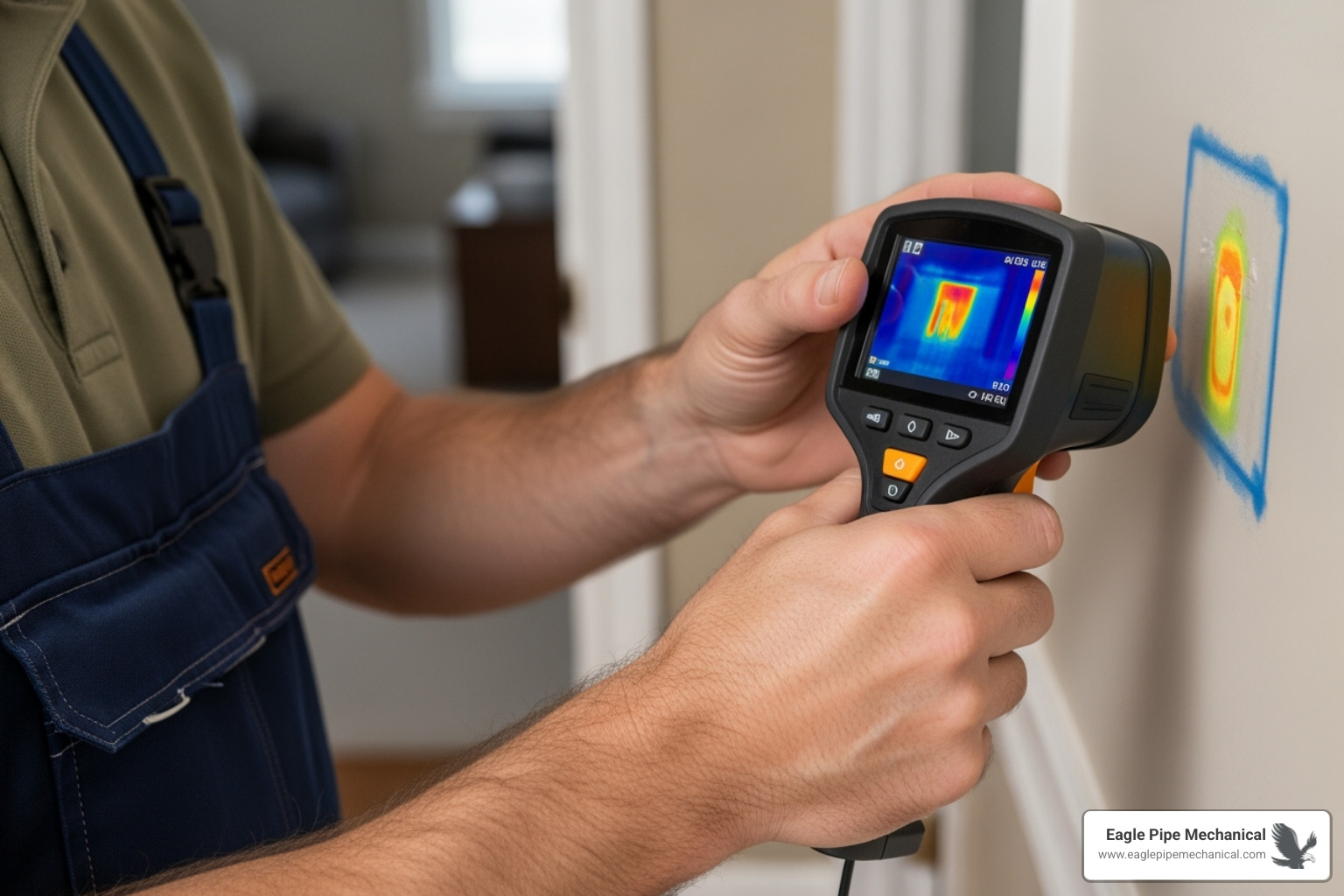
Common Recommendations for a More Efficient Home
While every home is unique, certain energy-saving upgrades appear frequently in audit reports. These improvements consistently deliver excellent returns on investment and dramatically improve comfort.
Air sealing tops the list for most homes because it's often the cheapest fix with the biggest impact. We're talking about sealing cracks around windows and doors, gaps around electrical outlets, and spaces where pipes or wires enter your home. A few tubes of caulk and some weatherstripping can eliminate those annoying drafts that make your heating and cooling systems work overtime.
Insulation upgrades follow closely behind, especially attic insulation since heat naturally rises and escapes through your roof. Many homes also need wall insulation improvements, though this involves more work. Don't forget about spaces like crawl spaces and basements – insulating these areas prevents heat transfer through your foundation.
Duct sealing addresses one of the biggest energy wasters in most homes. When ducts leak into unconditioned spaces like attics or crawl spaces, you're essentially heating or cooling the outdoors. Proper duct sealing ensures your conditioned air actually reaches your living spaces, which can extend your HVAC system's life and potentially delay the need for HVAC replacement to maximize efficiency.
Water heating improvements often make the list too. Simple steps like insulating your water heater tank and pipes can reduce standby heat loss. If your water heater is getting old and inefficient, we might recommend a water heater replacement with a high-efficiency model.
LED lighting upgrades are the easiest wins – modern LEDs use 75% less electricity and last 10 times longer than old incandescent bulbs. Similarly, upgrading to ENERGY STAR appliances when your current ones wear out can significantly reduce your energy consumption.
These recommendations work together like a team. When you seal air leaks, add insulation, and fix ductwork problems, the combined effect creates a home that's not just more energy-efficient, but genuinely more comfortable to live in.
Finding an Auditor, DIY Checks, and Available Incentives
Now that you understand the value of an energy audit service, you're probably wondering about your next steps. Should you hire a professional or tackle some checks yourself? What kind of financial help is available? Let's walk through your options so you can make the best choice for your home and budget.
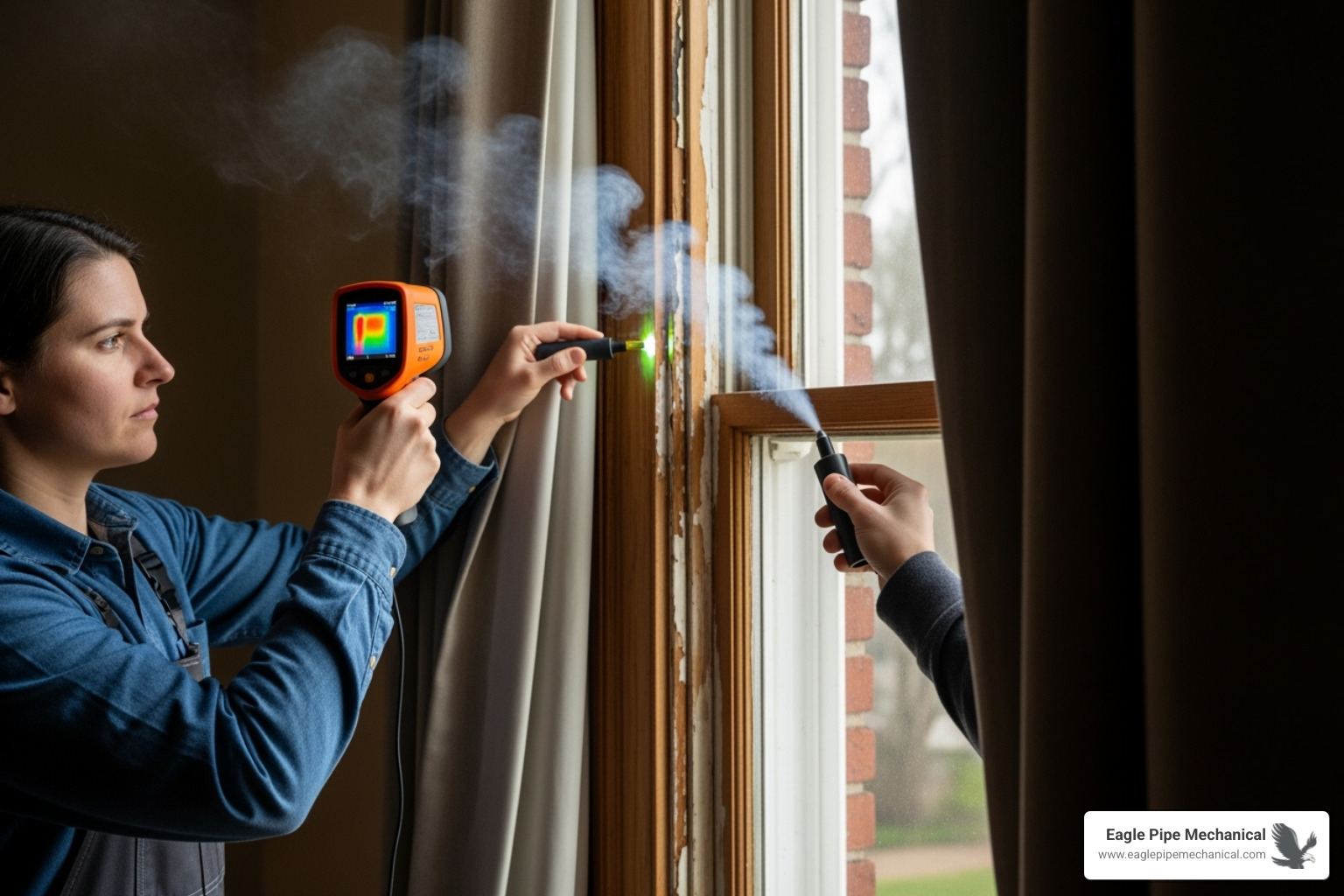
How to Choose a Quality energy audit service
Finding the right professional for your energy audit service makes all the difference between getting a thorough assessment and just paying for someone to walk through your house with a clipboard. You want someone who combines expertise with the right tools to give you accurate, actionable results.
Start by looking for certifications, especially from respected organizations like the Building Performance Institute. A BPI certified auditor has completed rigorous training in building science and knows how to properly diagnose energy problems. This isn't just a nice-to-have – it's essential for getting reliable results.
Don't skip the homework phase. Check references and read customer reviews from previous clients. A quality auditor will happily provide references and should have positive reviews that mention thoroughness, professionalism, and helpful recommendations. Look for comments about whether the auditor explained things clearly and followed through on promises.
When you're interviewing potential auditors, ask about their tools. Any serious professional should use a blower door test and thermographic technology as standard practice. If they don't mention infrared cameras or seem unsure about these tools, keep looking. These aren't expensive add-ons – they're fundamental to finding problems your eyes can't see.
Consider choosing a certified assessor who can provide an official Home Energy Score. This standardized rating helps you understand how your home compares to others and can be valuable if you're planning to sell.
If you're hoping to claim federal tax credit eligibility, make sure your chosen auditor meets the requirements for programs like the 25C Tax Credit. The right certification can save you money down the road, so it's worth asking about upfront.
Can You Do a DIY energy audit service?
Absolutely! While a professional energy audit service gives you the most comprehensive picture, a DIY energy audit can uncover plenty of money-saving opportunities without any upfront cost. Think of it as your home's preliminary check-up.
Start with a thorough walk-through assessment. Grab a notepad and spend an hour really looking at your home. During your visual inspection, check for obvious problems like cracked caulk around windows, gaps under doors, or weatherstripping that's seen better days.
To locate air leaks, try the old-fashioned smoke test. On a breezy day, light an incense stick and slowly move it around window frames, door edges, electrical outlets, and anywhere different materials meet. When the smoke wavers or gets sucked toward a crack, you've found a leak worth sealing.
Head up to your attic to check insulation levels. Is the insulation evenly spread, or are there bare spots? Does it reach the recommended depth for your area? You can check the ENERGY STAR climate zone map to see what's recommended for the Pacific Northwest.
While you're evaluating your home, inspect your lighting situation. Count how many old incandescent bulbs you're still using – each one is an easy opportunity for savings. Also review the age of major appliances like your furnace, water heater, and air conditioner. If they're getting long in the tooth, they might be costing you more than you realize.
Don't forget about your HVAC system's air filter. Look for clogged air filter signs like reduced airflow or visible dirt buildup. A dirty filter makes your system work harder and waste energy.
A DIY audit won't catch everything – you can't easily measure duct leakage or see inside walls – but it's a great way to identify the low-hanging fruit and decide if a professional assessment is worth the investment.
Rebates, Incentives, and Tax Credits
Here's some good news: you don't have to pay full price for making your home more efficient. Various government programs and local utility rebates can help offset the costs of both energy audits and the improvements they recommend.
The federal government offers tax credits through programs like the 25C Tax Credit, which can help you recoup costs for qualifying energy-efficient improvements. These credits can apply to insulation, windows, doors, and certain HVAC equipment. The key is ensuring your upgrades meet the specific requirements, so keep good records and work with qualified professionals.
Your state and local incentives vary depending on where you live, but many areas offer additional rebates or low-interest loans for energy improvements. Since we serve Kitsap and Jefferson Counties, we stay up-to-date on Washington state programs, but it's always worth checking with your local energy office for the latest opportunities.
Many utility company programs offer their own incentives, including discounted or even free energy audits. Some utilities participate in Home Performance with ENERGY STAR programs that start with an assessment and continue with rebates for recommended improvements. Call your utility provider – you might be surprised what's available.
We also offer our own promotions throughout the year to help make energy-efficient upgrades more affordable. Between federal credits, local rebates, and our specials, the actual cost of improving your home's efficiency is often much less than the sticker price.
The bottom line? These programs exist because everyone benefits when homes use energy more efficiently. Take advantage of them – it's like getting paid to make your home more comfortable.
Frequently Asked Questions about Energy Audits
How much does a professional energy audit cost?
Here's the straight answer: most comprehensive energy audit services that include all the advanced diagnostic tools (blower door tests, infrared cameras, the whole nine yards) typically run between $300 and $600. The exact price depends on your home's size and how complex the assessment needs to be.
Now, we know that might sound like a chunk of change upfront, but here's how we like to think about it: this isn't really an expense – it's an investment in your home's future. The energy savings you'll see on your monthly bills often pay back that audit cost within just a few years. After that? Pure savings, month after month, for as long as you live in your home.
Plus, don't forget to check if your utility company offers discounts or if there are local rebates available. Sometimes these programs can significantly reduce your out-of-pocket costs, making the decision even easier.
How long does an energy audit take?
The actual on-site assessment where the auditor is at your home typically takes 2 to 4 hours. During this time, they are busy interviewing you about your home's quirks, conducting visual inspections, and running all those diagnostic tests with specialized equipment.
But the process doesn't end; there's the important work of report generation – analyzing all that data was collected and turning it into your personalized roadmap. This usually takes a few days to do properly.
Finally, schedule a follow-up discussion to walk through your report together. Make sure you understand every recommendation and feel confident about your next steps. The entire process ensures you get a complete, actionable plan for improving your home's efficiency.
Is an energy audit worth it for a new home?
This question always surprises people, but absolutely yes! You might think a brand-new home would be automatically energy-efficient, but we've seen plenty of new constructions that benefit tremendously from an energy audit service.
Here's the thing about new homes: they're built by humans, and humans sometimes make mistakes. We regularly find issues in new constructions that aren't obvious to the naked eye. Air sealing might not be as thorough as it should be. Insulation could be missing in hard-to-see areas or installed improperly. Ductwork problems like poor connections or leaky joints are surprisingly common, even in homes fresh off the construction line.
An audit also helps you verify builder claims about energy efficiency. Instead of taking their word for it, you get objective, scientific data about how your home actually performs. This is especially valuable for systems installed during HVAC installation for new construction, where proper sizing and installation are critical for long-term efficiency.
The best part? Catching these issues early means they're usually easier and less expensive to fix before you've lived with high energy bills and uncomfortable rooms for years. Think of it as quality assurance for one of the biggest investments you'll ever make.
Conclusion: Your First Step Towards a Better Home
Getting an energy audit service isn't just about finding problems in your home - it's about finding opportunities. Think of it as the moment you finally understand why that one room is always freezing, or why your energy bills seem to climb every month despite your best efforts.
Throughout this guide, we've walked through the science behind energy audits to show exactly where your hard-earned money is literally disappearing through your walls. The benefits speak for themselves: most homeowners save 10-20% on their energy bills, enjoy consistent temperatures throughout their home, and breathe cleaner air. Plus, you're adding value to your property while doing something good for the environment.
The roadmap to efficiency starts with understanding where you are today. Whether you choose a professional audit with all the high-tech diagnostic tools or begin with your own DIY walk-through, you're making a smart investment in your home's future. The data doesn't lie - homes that undergo energy improvements based on audit recommendations consistently perform better and cost less to operate.
At Eagle Pipe Mechanical, we've seen how the right improvements can transform a home. While we specialize in expert HVAC Services and Plumbing Services throughout Kitsap and Jefferson Counties, WA, we know that true home comfort starts with understanding your home's unique energy personality.
Your audit report is your action plan. It tells you exactly which improvements will give you the biggest bang for your buck. Maybe it's sealing some air leaks, upgrading your insulation, or perhaps it's time to maximize your home's efficiency with an HVAC replacement. Whatever the recommendations, you'll know they're based on real data, not guesswork.
The best part? You don't have to tackle everything at once. Your audit prioritizes the improvements, so you can start with the quick wins and work your way up to the bigger projects. Each step gets you closer to that comfortable, efficient home you've been dreaming of - and the lower energy bills that come with it.
CUSTOMER TESTIMONIALS
Our customers’ experiences say more than we ever could. See how Eagle Pipe Heating & Air has earned trust across the Pacific Northwest with reliable service and lasting results.
